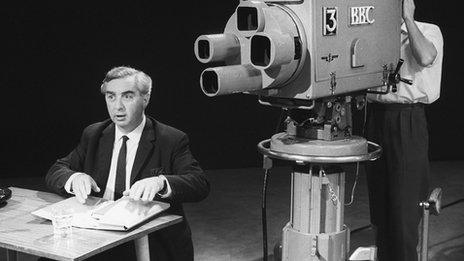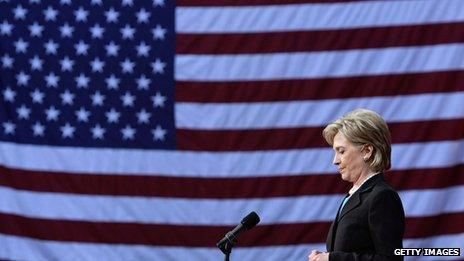The 10 most scandalous euphemisms
- Published

Congressman Mark Sanford has returned to frontline politics after ensuring "hiking the Appalachian Trail" became a euphemism for infidelity. What other scandals have enriched the lexicon?
1. "Hiking the Appalachian Trail" When South Carolina Governor Mark Sanford disappeared for six days in 2009, his aides told reporters he had gone for a walking holiday along the US's most celebrated hiking route. In fact, it soon transpired Sanford had been with his Argentine mistress in Buenos Aires. The phrase quickly ignited the imaginations of the press corps. "I think we should start using 'hiking the Appalachian trail' for discussions of future political scandale, don't you?", suggested commentator Andrew Sullivan., external The subsequent popularity of the phrase did not prevent Sanford winning election to the House of Representatives, where he is due to be sworn in.
2. "Discussing Uganda" In 1973, the satirical magazine Private Eye reported that journalist Mary Kenny had been disturbed in the arms of a former cabinet minister of President Obote of Uganda during a party. Variations of "Ugandan discussions" or "discussing Uganda" - the term is believed to have been coined by the poet James Fenton - were subsequently used by the Eye to describe any illicit encounter, and the phrase soon became part of common usage.
3. "Didn't inhale" The political career of Bill Clinton has been far from unencumbered by scandal - not least when he attempted to redefine "sexual relations", external. But perhaps his greatest linguistic legacy came during his campaign for the presidency when he admitted he had smoked marijuana but "didn't inhale"., external Almost immediately, the verb "to inhale" was deployed on campuses everywhere in place of "to get high". Even Clinton's successor-but-one got in on the act. "The point was to inhale," Barack Obama told reporters in 2008,, external admitting his own youthful drug use. "That was the point."

George Brown's television performance inspired reporters to evade the libel laws
4. "Tired and emotional" In 1957 The Spectator lost a libel trial brought by three Labour politicians whom it accused of having been drunk. Intoxication being difficult to prove retrospectively in court without a blood sample, British journalists cast around for an alternative phrase. The result, at first, tended to be associated with Labour's deputy leader George Brown. Some sources suggest the phrase was first coined by Brown's agent, Edward Eldred, when making excuses for his erratic boss. But it was popularised when Brown made a televised tribute after President John F Kennedy's assassination while visibly inebriated. A press release the following day described his condition as "tired and emotional", external - a form of words adopted by Private Eye and others in their wake.
5. "Final user" The carnivalesque private life of Silvio Berlusconi introduced a bemused world to the notion of "bunga bunga". An escort named Patrizia D'Addario, who said she slept with the former Italian prime minister at a party, extended his linguistic legacy. The politician's lawyer Niccolo Ghedini denied the claims - and said because D'Addario said Berlusconi had not personally hired or paid her he would have been the "utilizzatore finale" or "final user" of her services, and thus was not criminally liable. Despite Ghedini's protestations of his client's innocence, the phrase has become a euphemism for men who use prostitutes.
6. "Economical with the truth" A term with a habit of surfacing during politically-charged legal cases. UK Cabinet Secretary Robert Armstrong used the phrase in a Sydney court in 1986, when the British government took legal action in Australia to try to stop the publication of Spycatcher, the memoirs of a former MI5 agent. A few years later, former minister Alan Clark admitted he had been "economical... with the actualite" during the Matrix Churchill trial in 1992. Armstrong later wrote a letter to the Times newspaper in which he said he derived the phrase from 18th Century statesman Edmund Burke.
7. "Wide stance" - Idaho senator Larry Craig was arrested for lewd conduct in an airport toilet during a police sting operation. The arrest report stated that Craig claimed his foot had touched that of an undercover officer in an adjacent cubicle "because he has a wide stance when going to the bathroom". Craig pleaded guilty to a lesser charge of disorderly conduct but, when the case became public, protested his innocence and denied he was gay. Although Craig may not have actually used the term himself, "wide stance" was swiftly seized upon by comedians and slang dictionaries., external

'Mis-speaking' did not help Hillary Clinton's campaign for the presidency in 2008
8. "Mis-speak" In 2008, Hillary Clinton claimed to have been pinned down by sniper fire while on a trip to Bosnia. When video footage suggested otherwise, she went in front of the cameras and admitted: "I did mis-speak the other day." At the time, lexicographer Tony Thorne predicted in the Magazine, external that in future the term "will probably only be used ironically or mockingly". It had, however, previously been used by Republican candidate John McCain and the staffs of Presidents George W Bush and Ronald Reagan.
9. "Watching badgers" Ron Davies had already experienced what he called a "moment of madness", external on London's Clapham Common in 1998, during which he was mugged. The incident led to his resignation as Welsh Secretary. Then in 2003 The Sun newspaper claimed it had photographed him engaging in a sex act with a stranger at a picnic spot. After initially denying he had ever visited the area, Davies then changed his story and said he had been there "watching badgers", external, a phrase that the tabloid suggested should find its way into the Oxford English Dictionary.
10. "Slipping my moorings" Innuendo travels quickly in the age of social media. No sooner had former CIA chief David Petraeus apologised in March 2013 for "slipping my moorings", external by having an affair with his biographer, the Sunday Times' Camilla Long tweeted:, external "Best euphemism for illicit sex so far today."
You can follow the Magazine on Twitter, external and on Facebook, external